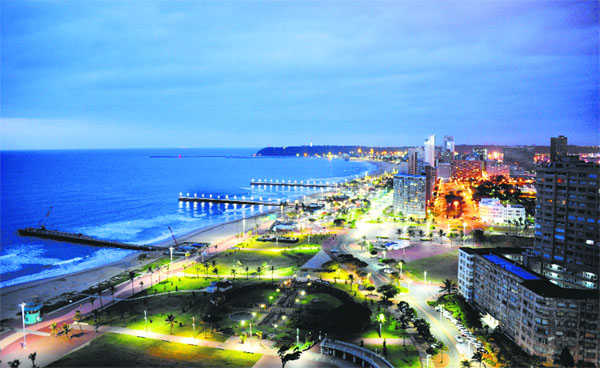
Preeti Verma Lal
A walk into living fossils. A mosque that was once the largest in the southern hemisphere. Bunny Chow, the city’s favourite food, that owes its origin to innovative Indian indentured labour. Beaches where once sharks ruled. Mighty oceans where whale stations were once ubiquitous. The town into which a strapping 23-year-old barrister called Mohandas Karamchand Gandhi stepped into to fight a civil suit for a rich Indian. A city where the tap water is so good, it is rated as one of the best in the continent. A city that calls itself the warmest place to be. Durban, the city that borrows its name from Governor Sir Benjamin d’Urban, is all this and much more.
The moment one steps out of the King Shaka International Airport, the city’s crisp air blue-pencils the long-haul fatigue. Magically, if you will, Durban straddles the contemporary and the old with élan. On the paved sidewalk, time stares at its own beginnings. To that Christmas Eve of 1497 when Portuguese explorer Vasco da Gama sighted the natural harbour, where the current city of Durban was later founded. He named it Rio de Natal (Christmas River in Portuguese). There is no statue of the explorer in the city but a large Vasco da Gama clock sits by the Victoria Embankment (now known as Margaret Mncadi Avenue). Made of cast-iron and shaped like a dome, the regal Victorian piece was forged in a British foundry and includes a statue of Samson breaking the ropes that bound him. The clock is dead. The salty sea has rusted the monument but even in its rueful state, the clock is a tribute to an intrepid explorer.
The explorer brought alive this scrap of land on the geographical map. But 396 years later, it would take a young barrister to lend peaceful credence to the city of Durban. It was here that passive resistance was destined to be born, when on May 24, 1893, a lanky 23-year-old barrister called Mohandas Karamchand Gandhi arrived from India to represent Seth Dada Abdullah, a wealthy Muslim business and community leader, in a civil suit against his cousin. The young lawyer first lived in Grey Street and was to later move to the Phoenix settlement. There are no footprints of Gandhi on the harbour but one can find him at the old railway station. The green columns and a brick-facade building beckon. It was from this station that Gandhi had boarded the infamous train to Pretoria when at Maritzburg, he was ordered to leave the First Class compartment at the instigation of a White man. The staircase that Gandhi must have walked has no footprints. But his bust stands by the door. At the bottom is his quote: My life is my message.
Gandhi had stepped into the city much after the first batch of 342 Indian indentured labour arrived in Durban aboard Truro from Madras on November 16, 1860. Ten days later, the second batch of 210 Indians reached Durban on board Belvedere from Calcutta to work on sugar plantations. The arrival of Indians metamorphosed the Zulu land. The air became rife with the aroma of spices, the bells clanged in the first Hindu temple built in 1901, and the workers invented what would become synonymous with Durban — the Bunny chow, a scooped out loaf bread filled with curried beans. It was not taste that created bunny chow; it was the need of the day, as the labourers had to carry lunch as they toiled in the sugarcane fields.
Walk into Victoria Market and the Indian anima of Durban comes alive. Women wearing saris with vermillion blazing in their parted hair selling trinkets and fried munchies, men still speaking Gujarati, statues of Hindu deities, sequined saris, copper vessels…. In Victoria Market, the idiom is uncannily Indian. While traders were stashing money with the sale of spices and produce, Gandhi built a modest home in the Phoenix Settlement, started the newspaper Indian Opinion and lit the spark of passive resistance. There, Kasturba Gandhi ran a school for little children. In Grey Street, now renamed Dr Yusuf Dadoo Street, South African Indian writers were filling their pen with blood and crying hoarsely about the tyranny of harsh laws and the horror of being brown skinned. Grey Street was the setting of so many works of fiction and non-fiction that one would think that it was gravelled with words.
In Durban, when the sun gets ready to dip into the sea, children pull out their skateboards and BMX bicycles and spin around fearlessly in the skate park by the beach; men dress in traditional costumes, hand pull lavishly decorated rickshaws and take eager tourists for a ride; local Zulu women sit in sand and string beads into exquisite necklaces and earrings and the century-old lighthouse brightens the inky sea with slanted light. Durban glimmers at night. Apartheid is dead. On Grey Street, blood no longer curdles at the behest of oppressive laws. In Durban, even the palm sways freely in the salty breeze. There is nothing to fear anymore. It is all peaceful in the beautiful city. Durban is the warmest place to be.



























